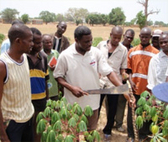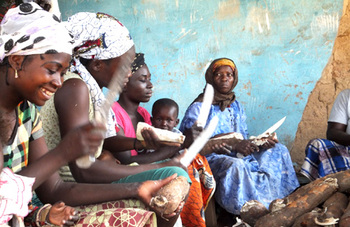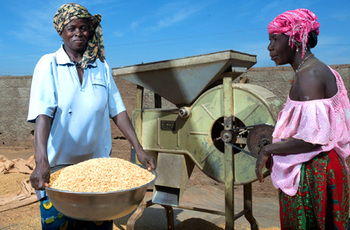Agricultural development
Programme description
Title: Agricultural Development Programme
Commissioned by: German Federal Ministry for Economic Cooperation and Development (BMZ)
Country: Burkina Faso
Lead executing agency: Ministère de l'Agriculture, des Ressources Hydrauliques, de l'Assainissement et de la Sécurité Alimentaire (MARHASA)
Overall term: 2004 to 2016

Context
Around 80 per cent of Burkina Faso's population earn their living from agricultural production, which generates around 40 per cent of gross domestic product. Despite its significance, the agricultural sector's technical and economic capabilities are low, which means that the economic and social situation of the farmers is often very poor.
The combination of population growth of more than three per cent, extremely extensive use of natural resources for agriculture and climate change is threatening the nutritional base of the population of Burkina Faso. To secure this nutritional base in the medium term, it is vital to harness all available potential to make agriculture more intensive, especially since there are very few additional areas suitable for agricultural use.
Objective
The income of the rural smallholder population has risen and its nutritional base has improved. The population in the south-west of the country has become better adapted to climate change.

Approach
To achieve these objectives, the programme supports the government in implementing the Rural Sector National Programme. It supports entrepreneurs from the food sector and increases the competitiveness of the value chains of sesame, manioc, rice and horticultural products.
To this end, bottlenecks at the various stages in the production chain are analysed and eliminated together with all actors. For example, farmers are trained to use better seed and to apply principles of good agricultural practice. Processing and marketing firms are advised on improving their operating processes and introducing quality standards in order to gain access to new markets.
At the same time, it is necessary to put a stop to the ongoing loss of fertile agricultural soil through erosion. On behalf of the project, AFC Consultants International advises selected rural communities on how to reclaim infertile and eroded areas for cultivation and protect them against further erosion. This approach enables the population to respond better to the effects of climate change.
The project engages in policy dialogue with partners of the rural sector from ministries, institutions and authorities to develop better political and institutional framework conditions for agriculture.
Results
Since its beginnings in 2004, the project has been supporting and helping to shape the Rural Sector National Programme (PNSR). The government adopted this programme in 2012. Today, better organisation and training of employees enable the ministry and authorities to perform their tasks more effectively.
More than 25,000 producers, processors and marketers of sesame, cashew nuts, manioc and rice, around a third of whom are women, have been reached through the support of the programme. The average annual income of the market participants rose by an average of 60 per cent between 2004 and 2013.
Since 2010, over 10,000 sesame producers were able to improve their harvest yields and product quality to such an extent that exports rose by 75 per cent. Since 2007, the market share of attiéké (a type of couscous made from manioc) produced in Burkina Faso has increased by 300 per cent compared with imported attiéké. There has been an increase of over 300 per cent in the production, processing and marketing of cashew. Along the production chains, 6,000 additional jobs were created.

In the south-west of the country, the project has rehabilitated more than 20,000 hectares of degraded soils. The population uses the area as common land.